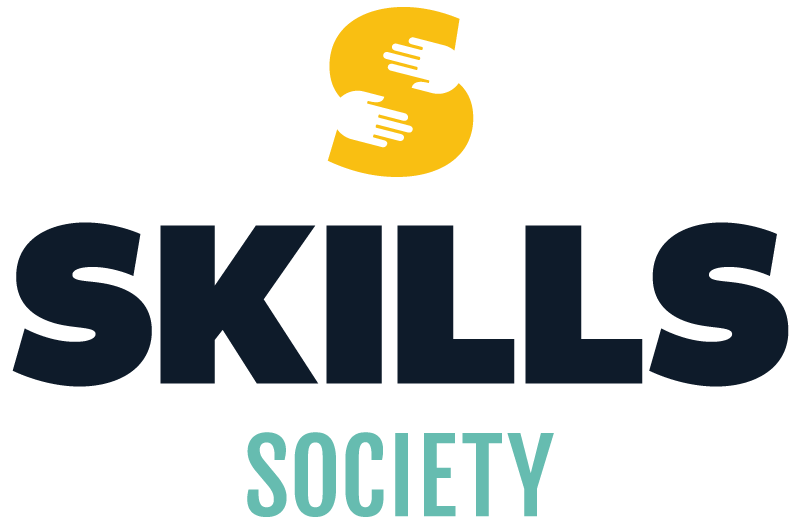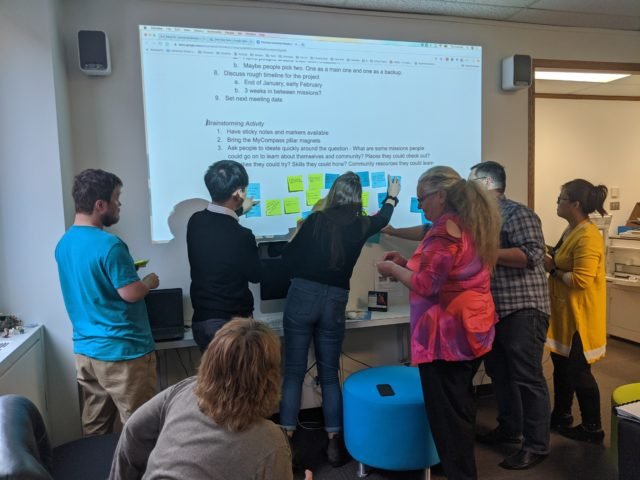Building Resilience Through Innovation
written by Paige Reeves, Senior Leader of Research and Social Innovation
At Skills Society, innovation is core to how we see the world and our work. To us, innovation isn’t just a buzzword - it is a culture we’re actively creating so that we can better meet the needs of the people we serve, avoid getting stuck, and tackle big and complex challenges like the kind we find ourselves facing today. Innovation is the way we stay resilient in the face of change.

This culture of innovation at Skills has allowed us to:
Listen deeply to people’s experiences
Be creative and think differently about problems
Let ideas go or evolve them rather than holding them too closely
Excel at iterating - testing, tweaking, and trying again
Seek and incorporate multiple perspectives when solving a problem
Learn from others and share what we’re learning
Embrace complexity rather than run from it
Build solutions collectively
In my role as Senior Leader of Research and Social Innovation, I have been fortunate to steward, alongside a stellar set of colleagues, several of Skills’ social innovations. Through this work, I have been able to witness the ways they both support the citizenship of the people we serve and ultimately contribute to building more resilient communities.
In the section that follows, you can get updated on our current innovations, what we’re learning, and how they support the citizenship of people with disabilities.
‘FUTURE OF HOME’ SOCIAL INNOVATION LAB
In March of this year we received just over $230,000 from the Canadian Mortgage and Housing Corporation (CMHC) to steward a social innovation lab on the “Future of Home” for people with developmental disabilities. Partnering with Inclusion Alberta, Capital Region Housing, and Homeward Trust, this lab will explore and develop two housing model prototypes that are affordable, accessible, and support the social inclusion of people with developmental disabilities in new and creative ways.
What we’re learning
Current housing and support models do not always support the deep belonging and inclusion of people with disabilities
Models like the one we steward at Melcor Village offer promising outcomes around flexible supports when people need them
How this supports the citizenship of people with disabilities
When people have access to stable and affordable housing, along with individualized support, they require less support from other systems such as justice and health
BELONGING RESEARCH
Paige is stewarding research on the patterns and practices that support the deep belonging of people with developmental disabilities as part of her doctoral research at the University of Alberta. As the research unfolds, Paige will engage some of the people we serve to explore their experiences of belonging in the community.
What we’re learning
Despite years of advocacy and efforts, people with disabilities often remain physically present but socially distant members of their communities
Many people with disabilities do still experience deep belonging in some relationships and spaces.
What patterns and practices support these experiences of belonging and how can we replicate them?
How this supports the citizenship of people with disabilities
When people feel a sense of belonging and connection to others and their community they are happier, healthier, and more satisfied with their life
MYCOMPASS PLANNING
The Mycompass Planning App continues to be used by the people we serve - helping them take the lead in planning and shaping what their support from Skills looks like. We continue to grow and improve the MyCompass Planning App and have recently added some new features such as:
Interactive data dashboards that make it easy for management teams to view, review, and interpret data across the organization
The ability for people served to like and favorite timeline posts with favorited posts showing up in a “Timeline Highlight Gallery”
The ability to assign a type to each goal encouraging people served and their supports to reflect together if the goal is something that stretches them from the familiar, promotes personal growth, or is a needed ‘quick win’
What we’re learning
A tool like MyCompass can help shape the way staff approach their work, encouraging a more person-centred approach
Support is more meaningful and helpful when it is directed by the person served
How this supports the citizenship of people with disabilities
People are empowered to be the leaders of their lives, directing their supports so they get the most out of them
MYCOMPASS PLANNING
The Mycompass Planning App continues to be used by the people we serve - helping them take the lead in planning and shaping what their support from Skills looks like. We continue to grow and improve the MyCompass Planning App and have recently added some new features such as:
Interactive data dashboards that make it easy for management teams to view, review, and interpret data across the organization
The ability for people served to like and favorite timeline posts with favorited posts showing up in a “Timeline Highlight Gallery”
The ability to assign a type to each goal encouraging people served and their supports to reflect together if the goal is something that stretches them from the familiar, promotes personal growth, or is a needed ‘quick win’
What we’re learning
A tool like MyCompass can help shape the way staff approach their work, encouraging a more person-centred approach
Support is more meaningful and helpful when it is directed by the person served
How this supports the citizenship of people with disabilities
People are empowered to be the leaders of their lives, directing their supports so they get the most out of them
Skills Leaders and Community Service Learning Students using divergent thinking practices to generate missions for the Missions App.
COMMUNITEA INFUSION PROJECT
CommuniTEA is a mobile tea house, run by people with disabilities, that travels to neighbourhoods around our city — creating a “pop-up” town square where people come together, get to know each other and strengthen connections. At the heart of the CommuniTEA Infusion project is a drive to spark connections amongst diverse community members, laying the foundation for feelings of inclusion and belonging.
What we’re learning
Counter to what many people think, people with disabilities do not have to be passive recipients of care but instead can be engaged builders of community
How this supports the citizenship of people with disabilities
Community members’ assumptions about disability are challenged and can change when they meet, have conversation, and connect with people with disabilities
Someone we serve working as a community builder at a tea van event.
CITIZEN ACTION LABS
Our 1.5 hour think tank process helps supports, families, and allies break free of assumptions, shake up their thinking, and generate, alongside people served, creative ideas to support citizenship.
What we’re learning
People with disabilities have many unique gifts and talents to offer their community; sometimes you just have to shake up your thinking to see them
How this supports the citizenship of people with disabilities
Our communities are richer, more exciting, and dynamic places when people are given the opportunity to share their unique gifts and talents
A Citizen Action Lab taking place in the Action Lab










